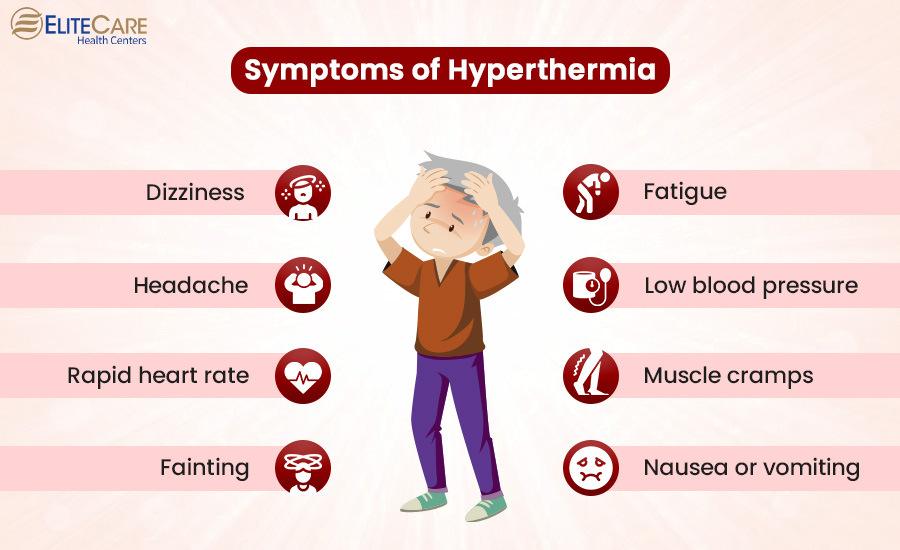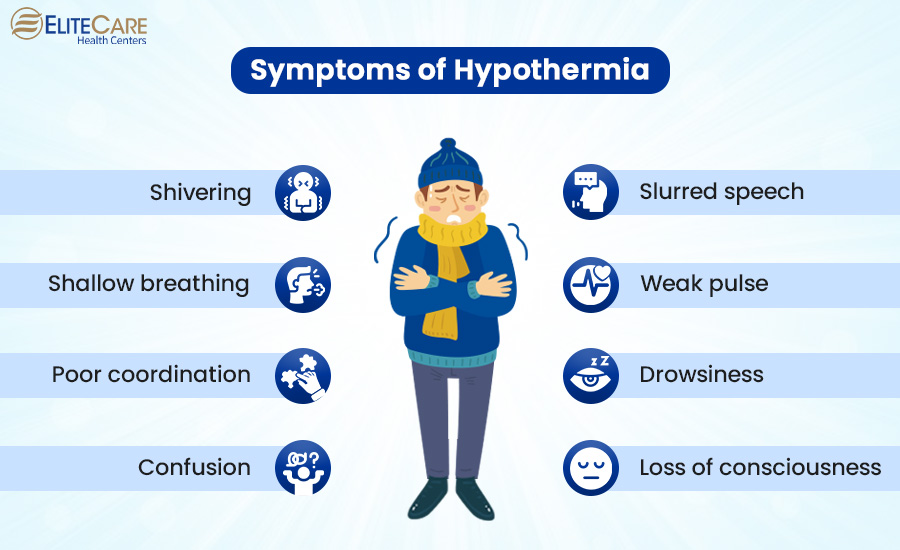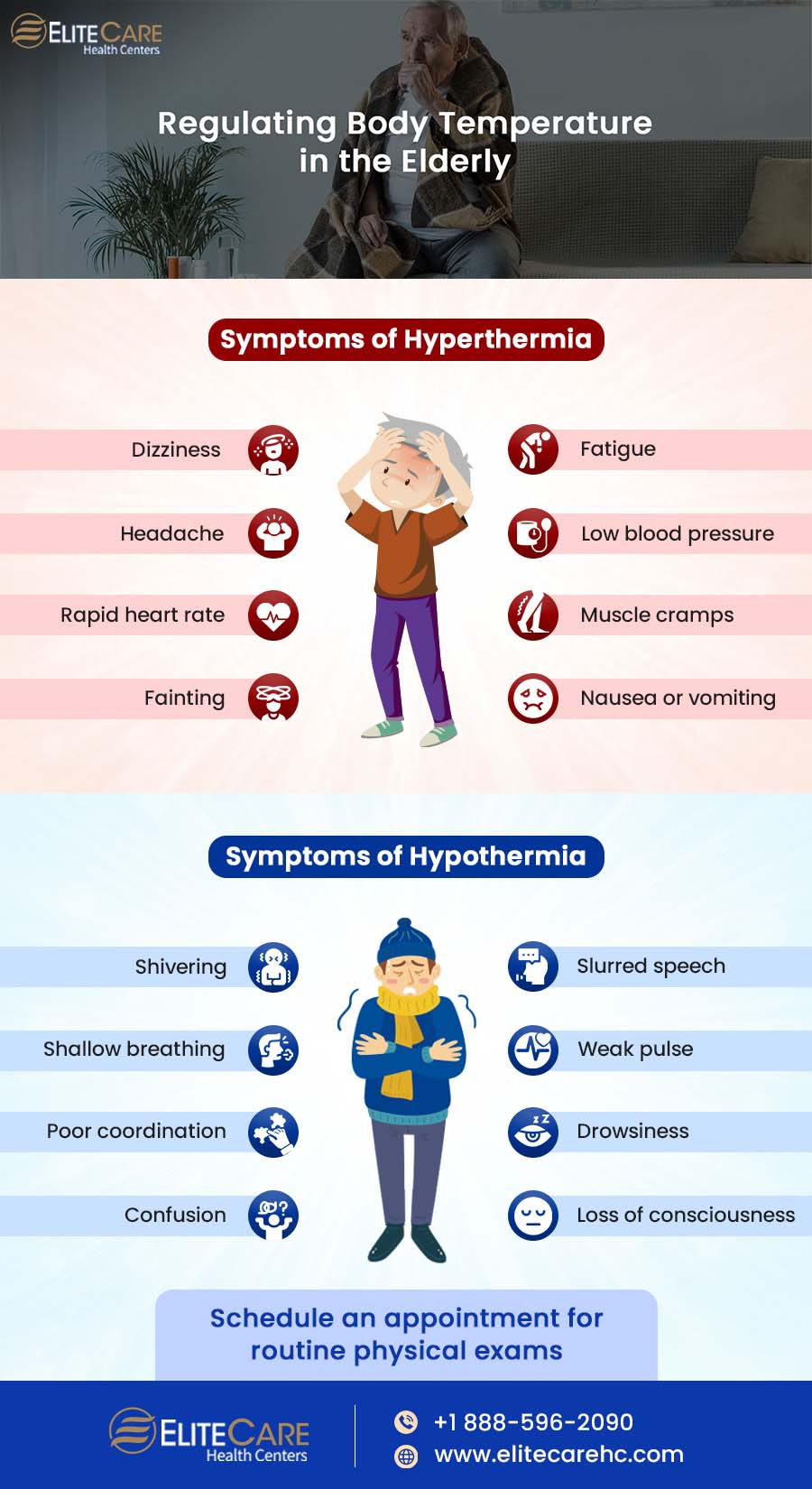
Our bodies have a built-in thermostat that operates continuously to maintain a steady internal temperature. In humans, normal body temperature is 98.6 degrees Fahrenheit or 37-degree celsius. If it gets too warm, the body generates sweat to lower the body temperature. Similarly, if it gets too cold, the body shivers and constricts blood vessels to limit blood flow and conserves heat.
But for seniors, the ability to regulate temperature is diminished due to various age-related bodily changes. When seniors are unable to regulate their body temperature, they can suffer heat stress (hyperthermia) or lose too much heat (hypothermia). Both conditions can be potentially life-threatening for them.
Why Are Seniors More Sensitive to Hot and Cold Weather?
Seniors have a harder time adjusting to sudden temperature fluctuations than younger people due to various reasons. Older adults are more likely to suffer from multiple chronic illnesses that prevent their bodies from responding to heat appropriately. They may be on certain medications like beta blockers or painkillers that affect their body’s ability to sweat and regulate temperature. This could explain why more than 80%1 of Americans who die from heat-related causes are over the age of 60.
As for sensitivity to cold weather, older people tend to have slower metabolisms, which makes it difficult for them to stay warm. They also have fewer layers of fat under their skin to insulate and trap body heat. Additionally, due to loss of elasticity, their blood vessels fail to constrict and limit blood flow, which in turn lowers their body temperature.
During extreme temperature fluctuations, as in the case of heat or cold waves, seniors who are unable to regulate their body temperature are likely to suffer from hyperthermia and hypothermia.
What is Hyperthermia?

Hyperthermia is a condition in which the body’s temperature rises as high as 113-degree Fahrenheit due to a failure in body’s heat-regulating mechanisms. Heat cramps, heat exhaustion, and heat stroke are all common forms of hyperthermia that seniors often suffer from.
Seniors suffering from hyperthermia usually present the following symptoms:
- Dizziness
- Fatigue
- Headache
- Low blood pressure
- Rapid heart rate
- Muscle cramps
- Fainting
- Nausea or vomiting
If an elderly person exhibits any of these symptoms, they should be moved to a cool, shaded area and given plenty of fluid to drink. If their symptoms persist, they should receive prompt medical attention immediately.
Read More: Foods That Help Lower Blood Pressure
How to Help the Elderly Manage Hot Weather
Heat stress can have serious effects on the human body and in severe cases, it can lead to coma or even death. To avoid the harm associated with overheating, seniors can take the following preventative measures to keep their body temperature in check:
Stay hydrated
Drinking lots of fluids, such as water or fruit and vegetable juices can reduce the likelihood of getting dehydrated on a hot day. Avoid alcohol and coffee as they are diuretics and will dehydrate the body further.
Read More: 7 Drinks to Keep the Elderly Hydrated
Wear loose-fitting clothes
Wearing light-colored, loose-fitting cotton clothes on a sunny day can help keep the body cool as natural fibres absorb sweat better than synthetic fibres.
Stay Indoors
Refrain from doing physical activities or exercises outdoors on hot days. Seniors are more likely to suffer heat stress while exercising under the direct sun than doing it indoors.
Keep the house cold
Switch on the fan or air-conditioning during the hottest part of the day to keep the house cool. Limit hot air from blowing into the house by keeping windows closed and curtains drawn.
Protect against sunburn
Wearing sunscreen that is SPF 15 or higher can protect seniors’ delicate skin against sunburns. Wearing a hat and sunglasses can also protect the head and eyes from getting overexposed to the sun’s glare.
What is Hypothermia?

Hypothermia is a condition where the body temperature drops below 35- Celsius due to prolonged exposure to cold temperatures. It is more common in cold weather but can also occur if a senior is cold from rain or sweat.
Symptoms of hypothermia include:
- Shivering
- Slurred speech
- Shallow breathing
- Weak pulse
- Poor coordination
- Drowsiness
- Confusion
- Loss of consciousness
If a senior citizen is suffering from any of these symptoms, ensure that they are moved into a warm dry place. Any wet item of clothing should be removed and replaced with dry, and warm clothing. They should also be covered with a blanket to keep them warm. If the symptoms persist, they should receive immediate medical attention.
How to Help the Elderly Manage Cold Weather?
Seniors with chronic illnesses like diabetes and kidney disease tend to be very sensitive to cold weather as these conditions restrict blood flow and lower body temperature. Chronic illness paired with a weakened immunity could expose seniors to a host of medical problems during winter seasons. Here’s how they can manage to stay warm during the cold:
Wear warm clothes
Wearing multiple layers of clothing can trap heat between each layer and keep seniors warm. It is also important to dress warmly when stepping outside by wearing wool socks, scarves, gloves and a hat.
Exercise
Exercise can help increase heart rate, regulate blood flow and keep the body warm. Doing light indoor exercise or Yoga can help keep one warm and also strengthen the immune system.
Keep the house warm
Make sure that there is no cold draft in the house by keeping the windows shut and fixing any dents that let outside air in. It also helps to dress warmly indoors as well.
Maintain healthy body weight
Seniors that are underweight tend to be more sensitive to the cold outside as the fat deposit in their body is not sufficient to keep them warm. Eating regular small meals consisting of whole grains, meat, pulses, vegetables, fruits, and nuts can help seniors maintain a healthy weight and keep them warm on winter days.
Read More: Finding a Low Sodium Diet for Older Adults
Conclusion
Climate change has made extreme weather events more frequent these days. Seniors unable to regulate their body temperature are likely to suffer from adverse physical reactions. Extreme heat or cold can affect the seniors’ heart, lungs, kidneys, liver and brain. Fortunately, there are a few simple strategies through which the elderly can reduce exposure to extreme weather.
Read More: What to expect from an annual physical exam?
If you’re struggling with body temperature regulation due to a chronic illness, consult a physician to address that issue promptly. Contact the nearest EliteCare clinic for routine physical exam or visit the website to schedule an appointment today.
- Tags:body temperature regulationCenter For Wellnesshealth and wellness centerhealth and wellness servicesmedical clinicmental health importanceprimary care clinicprimary care clinic near meprimary care physicianregulating body temperatureroutine physical examsenior care serviceswellness care centerswellness check doctor






